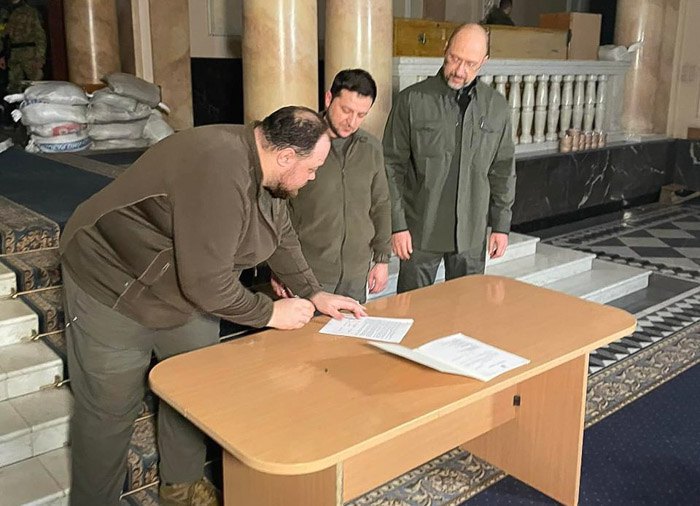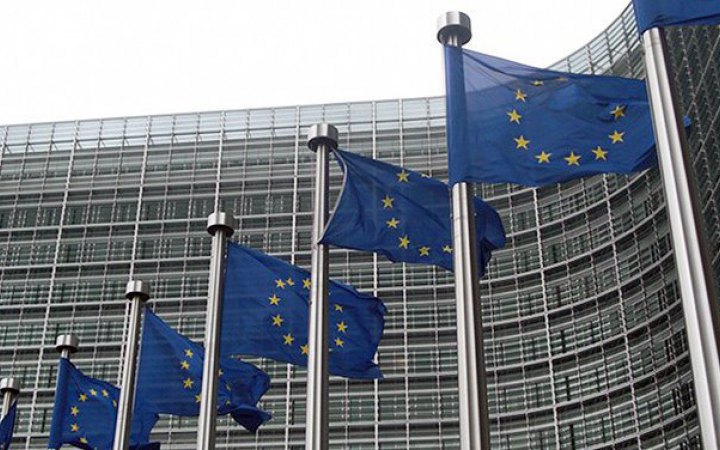The European Commission has recommended granting Ukraine candidate status.
The decision was made based on the results of the June 17 meeting and announced by the President of the European Commission, Ursula von der Leyen.
She noted that Ukraine, Moldova and Georgia applications were carefully considered for compliance with the Copenhagen and Madrid standards.
"Ukraine has very clearly proved its compliance with European principles," she said, referring to the eight-year war.
Von der Leyen added that our country still has to take some reform steps to get closer to the EU. These include the rule of law, anti-corruption activities and the fight against the oligarchs.
"One clear message: yes, Ukraine deserves a European perspective. Yes, we are happy to welcome Ukraine as a candidate," she said.
Detailed requirements were enumerated by the head of the President's Office, Andriy Yermak, on Telegram:
completing integrity check of candidates for members of the High Council of Justice and selecting candidates for the High Qualification Commission of Judges of Ukraine;
further strengthening the fight against corruption, in particular at the high level. Completing selection and appointment of a new director of the National Anti-Corruption Bureau of Ukraine and the prosecutor of the Specialized Anti-Corruption Office;
ensuring compliance of anti-money laundering legislation with the standards of the Financial Action Task Force (FATF);
adopting of a comprehensive strategic plan for reforming the entire law enforcement sector as part of Ukraine's security environment;
putting in action the "anti-oligarchic" law;
bringing media legislation in line with European audiovisual legislation;
completing the reform of the legal framework for national minorities, which is currently being prepared in accordance with the recommendations of the Venice Commission, and developing mechanisms for its implementation.
The European Commission has also decided to grant Moldova candidate status. Georgia will receive it if it meets a number of conditions.
The final word in granting this status belongs to the European Council - the highest political body of the EU. It consists of the heads of state and governments of all the countries of the Union. To grant Ukraine the status of a candidate for membership requires the consent of all 27 European Council members, that is, all EU leaders.
On February 28, the fifth day of Russia's full-scale invasion, President Volodymyr Zelenskyy signed an application to join the European Union. The signing took place against the backdrop of barricades and trenches erected in connection with the war.

After applying, Ukraine received and promptly filled out a thousand-page questionnaire. Even though at the beginning the talk was about Ukraine's accession to the EU under a "special procedure," it is in no way a shortcut to the bloc membership, and both the President and the Foreign Minister emphasized this. The country must take all steps to fully meet the EU's requirements for its members, and candidate status is one of the stages.
The European Council may grant Ukraine the status of a candidate for membership, refuse to do so, or assign the status of "candidate with conditions," which is a candidate to become a candidate.
Ukraine stressed that it needs a full-fledged status, as it proves its commitment to European principles daily in the bloody war launched by russia.
On June 8, the European Parliament supported the recommendation to grant Ukraine candidate status. However, Deputy Prime Minister for European Integration Olga Stefanishina said that there are at least three states that oppose the final granting of status by the European Council. She did not say which ones, but, according to journalists, they are Denmark, the Netherlands and Sweden.
In June, Polish President Andrzej Duda toured southern Europe to persuade them to support Ukraine's EU candidate status. The President of Slovakia also had to join him, but she fell ill with covid.
The leaders of France, Germany, Romania, and Italy also spoke unequivocally in favor of granting Ukraine candidate status. During their visit to Kyiv, they unanimously stated that they would support our state on the way to the EU.
Scholz, Draghi, Johannis and Macron also visited Irpin yesterday, where Community and Territorial Development Minister Oleksiy Chernyshov showed the leaders the price paid by Ukrainians for their European future - the destruction caused by the russian army.








